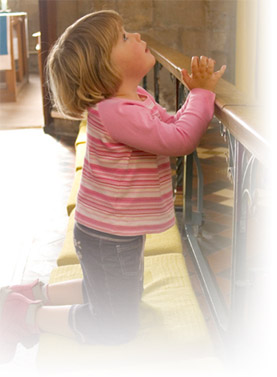Sunday Sermon for January 9, 2011, the Baptism of the Lord, Year A
Readings: IS 42:1-4,6-7; Acts 10:34-38; Mt 3:13-17
In the Gospel reading today we hear about our Lord coming to the Jordan River to be baptized by St. John the Baptist. When he sees Jesus the Baptist protests that he should be baptized by Jesus, but our Lord tells him that it is necessary to fulfill all righteousness.
This statement seems to make no sense because the Lord was perfectly righteous and certainly did not need to be baptized in a baptism of repentance for the forgiveness of sins. However, He entered the waters of baptism so that the rest of the Mystical Body could be washed clean. The water was poured upon the Head, but the whole of the Mystical Body was purified and made righteous.
In this way our Lord not only went before us like a good leader, but He went into the waters of the river so that the righteousness of God could be fulfilled in Him and in us. This righteousness included the point made in the first reading that the Lord’s Servant, Jesus, would be made a covenant to the people. The covenant is the very Person of Jesus and in baptism we are incorporated into this covenant. At the moment of our baptism all sin is removed from our souls, both original and actual (personal) and we are made righteous. Once this righteousness is present, we are given a participation in the very divinity of Jesus and so share in His Person and in His righteousness as participants in the Covenant.
The Prophet Isaiah tells us in the first reading that the Messiah is a covenant to be a light to the nations, open the eyes of the blind, bring out prisoners from confinement and to bring forth from the dungeon those who dwell in darkness. These are all accomplished spiritually at the moment of our baptism as well. The light of God pours into our souls, we are given the Theological Virtues of Faith, Hope and Charity so that we can “see” God, and we are freed from the bondage and darkness of sin and death. This is exactly what St. Peter speaks of in the second reading when he says that Jesus went about doing good and healing all those who were oppressed by the devil.
We might, naturally, think of all the people He exorcised during His public ministry, but those were only a few and they stand as outward examples of the power of God at work in each of us who inherited Original Sin from the moment of our conception. One might wonder, then, why we do not see this power working in us very strongly today. Why are we unable to see the Lord clearly through the eyes of faith? Why do we feel like we are confined or in darkness?
The reason is quite simple. We have given ourselves over to sin and have not been sufficiently purified to be able to walk fully in the light by faith and spiritual insight. The Scriptures are clear and the teaching of the Church is clear for anyone who wishes to avail himself of the Truth. However, in a society like ours which is almost defined by materialism, selfishness and a false dichotomy between faith and science, to the point that science implies truth and faith implies myth or foolishness. It is rather difficult to see God Who is love if we are selfish, God Who is spiritual if we are materialistic and God Who is known by faith when we think only those things demonstrated by scientific proof can be known.
When our Lord came up from the waters the heavens were opened and the voice of the Father was heard saying “This is My beloved Son with Whom I am well pleased.” The Gospel simply says that the heavens were opened to “him” and that “he” saw the spirit descending like a dove. It does not tell us if the person spoken of here is Jesus or John the Baptist, but since the voice of the Father speaks about Jesus rather than speaking to Him, I think we can safely infer that it refers to St. John the Baptist.
This being the case, we can see that it is only by grace that the clarity we desire can be attained. However, like the Baptist, we can do our part to prepare our hearts and souls. We do not have to go out into the desert and eat grasshoppers, but we do need to become more spiritual, more righteous, more charitable (love of God and neighbor) and live according to what is known and “seen” by faith. All this is possible for us through the baptism of our Head for the righteousness of the members and the baptism of the members for incorporation into the Covenant and a participation in all that is His.
Fr. Altier’s column appears regularly in The Wanderer, a national Catholic weekly published in St. Paul, Minn. For information about subscribing to The Wanderer, please visit www.thewandererpress.com.

